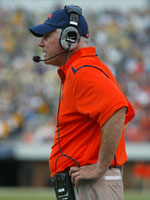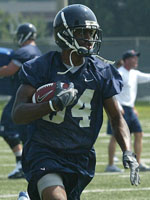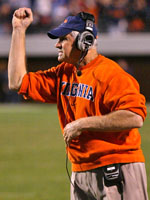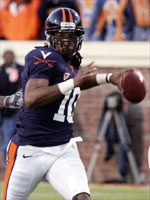 |
|
Virginia coach Al Groh will “not be retained as head football coach, effective immediately,” according to a press release Sunday. |
It is officially the start of a new era for both of Virginia’s revenue sports.
Virginia athletics issued a press release Sunday afternoon informing the media of the decision to dismiss football coach Al Groh, approximately 18 hours removed from the Cavaliers’ season-ending 42-13 loss to Virginia Tech on Saturday. Athletics Director Craig Littlepage met with Groh on Sunday morning to inform Groh that he would “not be retained as head football coach, effective immediately,” according to the release. The athletics department reached an agreement to pay Groh $4.33 million to buy out the remaining two years on his contract, a five-year, $1.7-million deal signed in August of 2006 and extended to 2011 after the 2007 season.
“I feel very fortunate,” Groh said in an emailed statement. “I am an ordinary guy who has been lucky to have been around some extraordinary players and coaches who put me in a position to enjoy many fulfilling games and seasons – and that’s the truth. I gave everything I had to the position and to each game.
“I have coached Hall of Fame players, worked alongside Hall of Fame coaches, and coached in two Super Bowls, but my time as the head coach of the Virginia Cavaliers has been my most memorable coaching experience.”
“There is not a coach in the college game who has worked harder than Al Groh in trying to build a football program. Football is his life and he dedicated himself to the University and to our football team,” Littlepage said in the release. “We are grateful for his service and for his commitment to his players and his coaching staff.”
Defensive backs coach Anthony Poindexter will remain on staff on a temporary basis since he has the longest tenure of any of the assistant coaches, and Bob Price will remain temporarily to help with recruiting, a media relations official said prior to a conference call with sophomore receiver Jared Green . The department release said that a coaching staff beyond those currently working on a temporary basis “will be assembled by the new head coach and it will be the choice of the new coach to determine if any current staff members are retained.”
Green spoke of a players-only meeting that they had today, in which they discussed where they would go from here.
“What continued to come up was just the fact that, the coaching change can only change so much,” Green said. “We have to change as our culture, and we have to work hard. We’re really excited about next season, but it starts with us.”
Groh finished with a record of 59-53 at UVa. His Virginia teams made five bowl games in nine years – winning three of them – and held a record of 1-8 against in-state rival Virginia Tech. According to the release, a national search for the next head coach will begin immediately, though Littlepage has not set a time frame since possible candidates are involved in postseason play.
“I sincerely appreciate the efforts of all the coaches and players who have been a part of our program – I am indebted to you,” Groh said in his emailed statement. “I hope the players feel that one of their most positive college experiences was playing for Al Groh.”
In his email, Groh also said that what led to his downfall was the deterioration of some of the basic principles that he tried to instill.
“My coaching philosophy and method of building teams has trust and teamwork as bedrocks,” he said. “We were poised to solidify our position as a top team. Instead, as that trust and collaboration deteriorated, I could see this day coming. We arrived with a set of principles that we have tried to remain faithful to and we leave with those principles intact.”
 |
|
Sophomore Jared Green said that a lack of teamwork was an issue for Virginia this past season. |
Groh was not specific as to whether trust and teamwork were lacking. Green offered a potential clarification, saying that the trust on the team was there, but the teamwork left something to be desired.
“We’re not playing the way UVa football is supposed to be played, and I think that’s why we only won three games this year,” Green said. “I totally agree with him on the [teamwork] thing. Trust, I’d have to hear what [Groh] means by trust.”
Speculation could infer that the lack in trust indeed refers to the relationship between Groh and the athletics department or school administration, a decline from 100 percent faith in Groh’s coaching abilities shown eight years ago. When Groh was hired on Dec. 30, 2000, then-athletics director Terry Holland spoke of national title contention, and Groh welcomed those expectations at the time. A 1967 UVa football alum, Groh arrived in Charlottesville after coaching the New York Jets in 2000 and working as an assistant coach in the NFL for 13 seasons. He also had coached in the ACC with Wake Forest from 1981 to 1986, and had served Virginia previously as the freshman coach from 1970-72 while doing double-duty as the defensive line coach for the varsity team from 1971-72. When hired, Groh was given a seven-year contract with a base salary of $200,000 and a total annual compensation package of $765,000.
“Coach Groh has enjoyed success at every level of football and certainly understands and embraces the challenge of building on the foundation laid by Coach [George] Welsh,” Holland said in the press release announcing the hiring. “His vision for the future of Virginia football that he described to us last night was inspiring. We are delighted that he has agreed to come home to the University of Virginia.”
In the news conference welcoming Groh to Charlottesville less than a week later, he said that only the head coach job at Virginia could have lured him away from his position with the Jets. “It was only for this particular opportunity that I would have ever left,” Groh said. He noted that Holland and University president John Casteen III “lured me in” to the job, and later added, “When the team doesn’t do well, you know who to blame.”
Groh inherited a Cavalier team that had gone 13-11 in its previous two seasons, and his first season at the helm was one of expected growing pains. The Hoos went 5-7 overall and 3-5 in the ACC, and failed to make a bowl game in 2001.
The disappointment continued through two losses to open the 2002 season, but, as would be a theme in the Groh era, Virginia bounced back. The Hoos reeled off six consecutive wins after the 0-2 start and finished with a 9-5 season that included a win over No. 15 West Virginia in the Continental Tire Bowl. Groh received the first of two ACC Coach of the Year Awards in his career at Virginia; the program appeared to be on the rise. The Cavaliers won the Continental Tire Bowl again the following year, defeating Pittsburgh to cap an 8-5 season, which also included a win over in-state rival Virginia Tech for the first time since 1998. That victory however, would be the only defeat of the Hokies in the Groh era.
 |
|
Al Groh led the Cavaliers to a No. 6 national ranking after a 5-0 start in 2004. |
The following season yielded the biggest high for the Hoos, as they started the season 5-0 – the last of those wins a 30-10 romp over Clemson on a Thursday night, surging Virginia to a No. 6 national ranking in The Associated Press poll. The Cavaliers’ sixth contest was a nationally televised game against then-No. 7 Florida State on the road, giving Virginia a chance to make a real statement that it belonged in the nation’s elite.
The Cavaliers were embarrassed in Tallahassee 36-3, however, and did not recover as the ’04 campaign continued. The Hoos lost three of their final four games that season, including a 37-34 overtime loss to Fresno State in the MPC Computers Bowl. Virginia fell to No. 23 in the AP poll to end the season, finishing with a record of 8-4.
Though the No. 6 ranking was the high point of Groh’s tenure, Virginia did not come tumbling toward mediocrity just yet. Virginia started the 2005 season by winning six of its first nine games, including perhaps the most thrilling home defeat of Groh’s career in a 26-21 victory against then-No. 4 Florida State, exacting revenge from the Hoos’ embarrassing loss one year earlier. Later, consecutive losses to ranked opponents Miami and Virginia Tech, though, dropped the Hoos to 6-5 entering the postseason. The Cavaliers pulled together to earn a hard-fought 34-31 win against Minnesota at the Music City Bowl despite working with a depleted coaching staff due to the departures of several assistant coaches to become head coaches at other programs.
During training camp for the 2006 season, Groh signed a new, five-year deal with a total annual salary of $1.7 million. The headline for the press release announcing the contract stated, “Al Groh Receives Five-Year Contract to Ensure Continuity and Future Success.” Littlepage also stated in the release that “this move recognizes Al as a coach who is among the best football coaches in the nation.”
The timing of the new contract, in hindsight, turned out to be poor as the downward spiral that ultimately ended Groh’s time at Virginia began in the 2006 season. The Hoos started that season 1-3, including the first of four consecutive embarrassing losses to open a season: a 38-13 loss to Pittsburgh. The Cavaliers’ only win in their first four games came against Wyoming at home when a missed extra point in overtime granted Virginia a 13-12 win. UVa also lost its first Homecoming game in Groh’s tenure: 17-10 to lowly Western Michigan. The Hoos went on to a bowl-less 5-7 record. The season was capped off by a 17-0 loss against Virginia Tech at Lane Stadium in a game where they gained just 112 yards of total offense.
Following the 2006 season, Littlepage did not exercise the option to extend Groh’s contract by a year, but said that he would be the coach at least through 2007; but, Groh was clearly on the hot seat, as Littlepage also said that the 5-7 season was below his expectations. And, Groh’s future did not appear bright with the first game of the ’07 season. The Cavaliers opened with a 23-3 loss to Wyoming, prompting the painting of “Groh must go!” on Beta Bridge.
 |
|
Jameel Sewell quarterbacked Virginia to a nine-win season in 2007, after which Al Groh received a one-year contract extension to 2011. |
With the rest of Virginia’s heart-stopping ’07 campaign, however, Groh likely saved his job for the next two years. Like the run of 2002, the Hoos went on a memorable winning streak, collecting seven wins in a row. They ultimately won an NCAA-record five games by two points or less. The 9-3 regular season record earned a trip to the Gator Bowl, where they lost an equally thrilling contest to Texas Tech, 31-28.
The Hoos’ 2007 season was filled with fortuitous bounces – the five close wins included a 1-of-3 performance from All-American kicker Sam Swank of Wake Forest, a fortunate fourth-down spot on a last-minute, game-winning touchdown drive against Maryland, and two consecutive high snaps on a potential game-winning drive for Connecticut. As Groh always said, though, “You are what your record says you are,” and the 9-4 record gave Groh his second ACC Coach of the Year Award, and Littlepage exercised the option to extend Groh’s contract by a year to 2011.
But, the Hoos immediately regressed back to mediocrity in 2008. The ’08 campaign began much like 2006 with a humiliating, albeit expected, loss to Southern California. What followed, though, were unprecedented low moments for the program: first, starting quarterback Peter Lalich was kicked off the UVa team, one of eight players to either be academically ineligible for the 2008 season or to dismissed from the team since the ’07 season. As former scout team QB Marc Verica stood under center, the defining moment of Virginia’s decline under Groh on the field came after the Hoos fell to Duke 33-3 on the road, snapping a streak of 25 straight losses to conference opponents for the Blue Devils.
The Hoos again showed resiliency in winning four games in a row following the loss to Duke, but went on to lose their final four contests to finish 5-7 once again. Virginia finished without a bowl game for the second time in three years, and outside the top 100 in total offense for the third consecutive season. Speculation began that, even as Groh had three years remaining on his contract, that his time at Virginia was finished.
Rather than the expensive option of buying out the remaining three years of Groh’s contract, however, an overhaul of Groh’s assistants took place in the offseason. Only two members of his 2008 staff remained in the same position in 2009: offensive line coach Dave Borbely and tight ends coach Bob Price. Gone was Mike Groh, Al Groh’s son and the offensive coordinator from 2006-08. In came Gregg Brandon, the spread offense guru whom, it was thought, would ignite Virginia with an exciting new offense that was out of Groh’s hands.
That offense never developed. One might have thought that a loss to William & Mary to open the season was the low point – and it did prompt a second painting of “Groh must go!” on Beta Bridge – but it only got worse for Groh in 2009. A glimpse at .500 after three straight October victories was followed by six consecutive losses to end the season, culminating in Saturday’s loss to Virginia Tech – the 10th loss to the Hokies in the last 11 meetings. The Hoos were again bowl-less, finishing with the fewest wins since 1986 and the most losses since 1982.
But, the writing was on the wall long before the season-ending loss to the Hokies, and the reasons for Groh’s firing certainly predate this past season. The decline in victories can be traced to the start of the 2006 season, when, ironically enough, Groh signed his five-year contract thru 2010, despite the fact that he had one year remaining on his initial contract. Subjectively, it could even be dated back to the then-No. 6 Hoos’ 36-3 loss to Florida State in 2004 – beginning with that game, Virginia went 32-36 during the rest of Groh’s tenure. Speculation of Groh’s firing occurred after the 2006 and 2008 seasons, when Littlepage eventually opted not to use the one-year rollover option on Groh’s contract.
As the losses piled up to end 2009, however, all the speculation turned to near certainty. Though the release states that the search for a new coach begins immediately, it likely is not the first time Littlepage has thought of who could potentially replace Groh as the coach. After all, according to Sean Singletary , Virginia was in contact with men’s basketball coach Tony Bennett in September of 2008 – six months before former coach Dave Leitao was fired.
Like the search for Bennett last spring, Littlepage will seek a coach that can bring UVa back to contention for the ACC Championship, and to competitiveness with in-state rival Virginia Tech. With the hole dug during the Groh era, that task does not appear easy; Littlepage, though, insisted that it can be done.
“Our goals for the UVa football program will remain the same. We will pursue winning and excellence in all facets of the University experience for our student-athletes, both on the field and in the classroom. There are a number of excellent coaches whose backgrounds and styles align with our goals and values,” Littlepage said in Sunday’s press release. “When you combine our aspirations with the institutional commitment to athletic facilities and resources, I believe that the job of head football coach at UVa will be attractive to some outstanding candidates.”
Green said that he wants a coach that is personable and family-oriented. While Green was quick to point out that Groh possessed those qualities, he said he desires a coach who displays those qualities to a greater degree.
“I might just be digging deeper – even more personable,” Green said. “My relationship with [Groh] was good, but it was good at the McCue Center, and that’s as far as it went.”
With regard to Groh’s future, he suggested in his emailed statement that he is not done coaching just yet.
“Change can make things better or worse,” Groh said. “I have every confidence that this will be a positive change for the Groh family and I look forward to my next game.
“To all the members of the Virginia football family: I love you and God bless you.”



